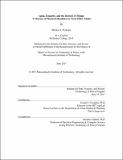Aging, empathy, and the Internet of Things : a measure of physician readiness to treat older adults
Author(s)
Psyhojos, Marika A
DownloadFull printable version (2.169Mb)
Alternative title
Aging, empathy, and the IoT : a measure of physician readiness to treat older adults
Measure of physician readiness to treat older adults
Other Contributors
Technology and Policy Program.
Advisor
Joseph F. Coughlin.
Terms of use
Metadata
Show full item recordAbstract
Aging is an increasingly disruptive force in the US -- nearly 1 in 5 Americans will be at least 65 years old by 2030. Largely due to the high incidence of chronic disease among older adults, health care spending is larger in magnitude for older adults than it is for any other age group. To treat older adults and reduce the prevalence of chronic disease more effectively and efficiently, health professionals may likely incorporate patient-generated health data (PGHD) from the Internet of Things (IoT). IoT devices can help providers to evaluate treatment options, compliance, and overall patient well-being. Critics of PGHD integration in the health care space cite challenges such as poor interoperability of devices and electronic health record systems, a lack of standards, a host of liability concerns, workflow interruptions, and a lack of reimbursement models. There is little research, however, that explores how the inclusion and analysis of PGHD may affect provider empathy and the physician-patient relationship. We were interested in understanding how the integration of wearables, smart devices, and other connected health devices would affect the physician-patient (or provider-patient) relationship and how those changes might affect both providers and patient health and well-being. We conducted two surveys, one of health care providers and one of patients, to understand current and expected uses of connected health devices to examine how the collection and analysis of PGHD will affect provider empathy and the physician-patient relationship. We subsequently examine across different age groups, how the provision of health care and individual health management is projected to change as a result of PGHD analysis. Finally, we evaluate the socio-technical barriers to connected health devices and discuss the entities which could successfully mitigate these barriers, as perceived by health care providers and patients.
Description
Thesis: S.M. in Technology and Policy, Massachusetts Institute of Technology, School of Engineering, Institute for Data, Systems, and Society, Technology and Policy Program, 2017. This electronic version was submitted by the student author. The certified thesis is available in the Institute Archives and Special Collections. Cataloged from student-submitted PDF version of thesis. Includes bibliographical references (pages 146-156).
Date issued
2017Department
Massachusetts Institute of Technology. Engineering Systems Division; Massachusetts Institute of Technology. Institute for Data, Systems, and Society; Technology and Policy ProgramPublisher
Massachusetts Institute of Technology
Keywords
Institute for Data, Systems, and Society., Engineering Systems Division., Technology and Policy Program.